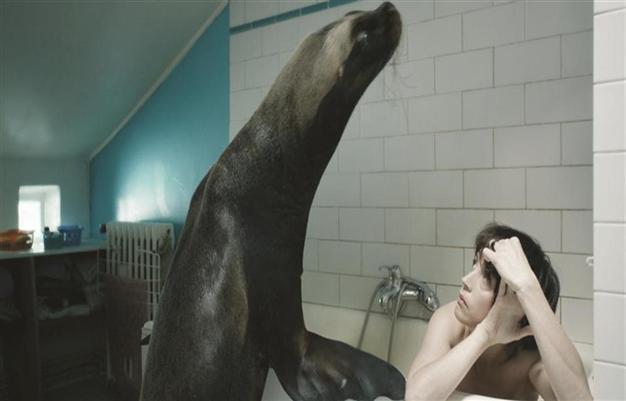Countdown starts for Flying Broom, women’s film event
ISTANBUL - Hürriyet Daily News

A scene from the 'Queen of Montreuil'. One of the most important categories of the festival is ‘Each Has a Different Color.’ Films tobe shown under this section since the festival’s 6th edition in 2003 are evaluated by the FIPRESCI jury.
The 16th Flying Broom International Women’s Film Festival will be organized between May 9 and 16 in Ankara. The theme of this year’s edition is embodied in the word “Despite...” This year the festival will feature 100 films across 15 categories. Apart from documentaries and animations, shorts will also be shown at this year’s event.The festival will open at the Ankara State Opera and Ballet with a ceremony and will focus on the moments in women’s lives in which they take a breath and say “despite…” on the streets, at home and in every area where the power bates.
One of the most important categories of the festival is titled “Each Has a Different Color.” Films under this section since the festival’s 6th edition on 2003 are evaluated by the International Film Critics Union (FIPRESCI) jury. Film selected by this jury will receive the Best Film award. Films selected for this category are recent efforts of 12 female directors from all over the world, some of whom have already won awards at international film festivals.
Films to compete for Best Film Award
Among these films are Australia-born Cate Shortland’s “Lore,” which tells the story of Lore, a teenager, and her siblings, who embark on a journey, walking 1,000 kilometers from her hometown to Hamburg as their parents are interred by victorious Allies.
The Ukrainian film “House with a Turret,” directed by Eva Neymann, portrays the story of an eight-year-old boy, who during the final winter of WWII travels with his mother to see his grandfather.
The Jordanian and Palestinian film “When I Saw You,” by Annemarie Jacir, shows another story of people affected by the times they live in. Tarek, 11 years old, comes to Jordan in 1967 as a refugee from Palestine and is looking for a way out of the camp he was placed in with his mother. This film is a story about that moment in a person’s life when he or she wakes up and finds the whole world is open and everything is possible.
 “Queen of Montreuil,” by Solveig Anspach, is about a woman who tries to find peace after her husband dies but her mourning is distracted by unexpected visit and left with no single moment of peace.
“Queen of Montreuil,” by Solveig Anspach, is about a woman who tries to find peace after her husband dies but her mourning is distracted by unexpected visit and left with no single moment of peace. Dutch director Threes Anna’s “Silent city” is about a Dutch woman coming to Tokyo to learn about fish preparation from Master-Hon, the best fish chef in the World.
Nana Ekvtimishvili and Simon Groß’s “In Bloom” is a Georgian-German-French co-production, based on Ekvtimshvili’s childhood memories of growing up in newly independent Georgia in the early 1990s, is a coming-of-age feature of female friendship, fatal feuds and family friction in post-Soviet Georgia.
French director Catherine Corsini’s “Three Worlds” is about three characters who react in different ways after being touched by the same tragedy, a car accident.
Aida Begic’s “Children of Sarajevo” is another account of growing up in a post-war environment and follows the stories of two orphans whose parents were killed in the Bosnian war as they struggle to live normally despite the difficult conditions around them.
Similarly to some previously described films, Sally Potter’s “Ginger and Rosa” is set in the past, 1962, and shows the story of a friendship of two politically involved teenage girls in the times of a growing threat of nuclear war.
“Marussia,” a French-Russian production directed by Eva Pervolovici is a film inspired by real characters of mother and daughter living on the streets of Paris, taking each day as if it was the day that could change their lives. It is a story about motherhood, multifaceted, conflicting and loving motherhood, a strong biome that functions as one, as the director herself explains.
The last film to be shown in this category will be Polish-produced “Bejbi Blues” by Kasia Rosuaniec, which depicts a teenage mother and the selfishness of her decision to have a child she regards as a fashion accessory to complement her fashion style.
















